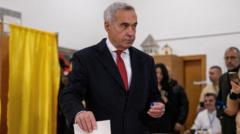Georgescu, who captured 23% of the votes, has garnered attention for his pro-Putin sentiments, raising skepticism about his campaign's legitimacy. Just before the ruling, there were controversies concerning social media bias, with claims that TikTok favored Georgescu's campaign. TikTok has publicly denied these allegations, emphasizing equitable treatment for all candidates. Despite finishing in a dismal third position, Prime Minister Marcel Ciolacu called the court's nullification a necessary step for the democratic process.
The constitutional law dictates that elections should resume two weeks after annulment, pointedly leading to a potential new election date of December 22. However, with the court's decision prompting an entire process overhaul, the timeline remains uncertain. The situation has evoked reactions from multiple political fronts, with various candidates’ calls for investigations into illegal financing and external influence on campaigns being rejected earlier in the week.
As Romania's political landscape becomes increasingly volatile, the motivations behind EU and NATO memberships, especially regarding Ukraine support, are becoming critical issues in this redefined electoral landscape. The forthcoming weeks promise to be pivotal, propelling Romania into uncharted political territory as it navigates through these tumultuous events.
Amidst accusations of being a pawn for foreign powers, Georgescu contends that the political establishment’s resistance stems from his unexpected rise. This pivotal moment in Romanian politics leads to speculation about future relationships within Europe, the broader implications for Euro-Atlantic alliances, and the integrity of democracy within the nation.
Romania must now brace for a full re-evaluation of its political processes, as questions around transparency, foreign interference, and electoral integrity loom large in the upcoming weeks.
The constitutional law dictates that elections should resume two weeks after annulment, pointedly leading to a potential new election date of December 22. However, with the court's decision prompting an entire process overhaul, the timeline remains uncertain. The situation has evoked reactions from multiple political fronts, with various candidates’ calls for investigations into illegal financing and external influence on campaigns being rejected earlier in the week.
As Romania's political landscape becomes increasingly volatile, the motivations behind EU and NATO memberships, especially regarding Ukraine support, are becoming critical issues in this redefined electoral landscape. The forthcoming weeks promise to be pivotal, propelling Romania into uncharted political territory as it navigates through these tumultuous events.
Amidst accusations of being a pawn for foreign powers, Georgescu contends that the political establishment’s resistance stems from his unexpected rise. This pivotal moment in Romanian politics leads to speculation about future relationships within Europe, the broader implications for Euro-Atlantic alliances, and the integrity of democracy within the nation.
Romania must now brace for a full re-evaluation of its political processes, as questions around transparency, foreign interference, and electoral integrity loom large in the upcoming weeks.

















